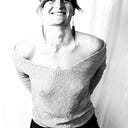Genius Children: A Reflection for International Mentoring Day : 1.17.16
I met Nelson Stevens — whom I fondly and to his endless and unhidden amusement call ‘Professor’ — in 2002, my Sophomore Year of Undergrad at UMass — Amherst.
I was about 19 at the time and he was 63. He walked into class, 5 minutes late, with his signature swagger and quoted Marcus Garvey.
“’A people without the knowledge of their past history, origin, and culture is like a tree without roots.’”
‘You dig?’ He asked.
I’ve been digging ever since.
Nelson was primarily a professor of Art (and a brilliant artist at that), but offered a syllabus for the History of the Black Arts Movement. In our first week, Nelson handed us the poem “Who Blew Up America” by Amiri Baraka. We read the piece aloud passing the paper around the room, verse by verse.
‘Like an Owl exploding | In your life in your brain in your self | Like an Owl who know the devil | All night, all day if you listen, Like an Owl | Exploding in fire. We hear the questions rise’
September 11th had just taken place the fall of the previous year. The question of “Who?” has resonated with me ever since. It’s been the root of my life practice and my work.
I took the lead in organizing our class’s day trip to New York City: Our visit to the Schaumberg, The Brooklyn Museum, and Kenkenaba Gallery. He must have been impressed with my organizing and navigating skills because he offered me a job as an assistant upon his retirement the following year.
For the next 3 years, I spent 3 to 4 hours a week working at his home in Springfield, MA — reading and writing emails (as he dramatically walked the room, smoking menthol cigarettes, and dictating his perfect response); paying bills; and usually making rice for him to have to eat for the week.
He paid me in cash, always provided snacks of roasted cashews, fresh dates, and chai tea. He usually had some misogynistic remark to make about his ‘secretary’ to which I would promptly chastise him, and then we would go about our work.
Nelson’s stories were endless. He spoke of attending house parties with ‘gangsters’ and James (Jimmy) Baldwin, his best friend & infamous Jazz drummer — Max Roach, the call to Black Arts organizers to the Pioneer Valley, and the students’ historical establishment of the New Africa House on UMass’s Campus.
I would be the first to say that my and Nelson’s relationship is unique. He definitely sits at the aging cusp of a father/grandfather figure. I’ve read, seen, or have been told a good majority of the tales and tragedies of his life and he knows the good majority of mine. I continue to harass him on when he is going to start painting again, and he continues to push me to do work to ‘make that money.’
When I think about the concept of mentors, I feel that we are really limited by what society deems acceptable. At first glance and without knowing our relationship, Nelson and I are an interesting pair. I’m 33, blonde, white, usually rocking a hoody, w/stilettos, boots, or converse and tight jeans. He is 77, Black, hailing from Brooklyn and usually rocking textile African prints, a sports coat, newsboy cap, and grey New Balance sneakers.
He and I met up in New York City on January 1st of this year (2016) for a weekend in the city together after not seeing each other for a few years. We joked that by day while shopping, site seeing or having lunch, people looked at us as if I were ‘his nurse’ and by night the stares were more that of a ‘high end escort.’
The dichotomy of the two is where Nelson and I meet, the middle. Our relationship has shifted as we have gotten older, but not by much. I still help him with random emails to galleries for installations and showings across the country. We have our old jokes, bets, and banter. I tell him his is getting grumpy with age and he reminds me that if I want children I need to stop being so fickle.
Both of my grandfathers have passed so in my mind he has somewhat assumed a similar role. As for his explanation of our relationship — “Love — do I pass the test (followed by a hearty laugh).”
Mentors are those in our life that are our musings — sparks of creativity, reminders to be honest and straight, relationships where judgment is suspended, but reflective advice is offered. They are the people who challenge you to dig deep — to see your reflection in their life experience and vice versa.
The most important thing that my mentorship with Nelson Stevens has taught me is that it’s never a matter of what you have in your life. It’s a matter of who is standing next to you as you continue to shed your skin and evolve into the person who you were born to be.
As Nelson says “all my students are genius children.”
